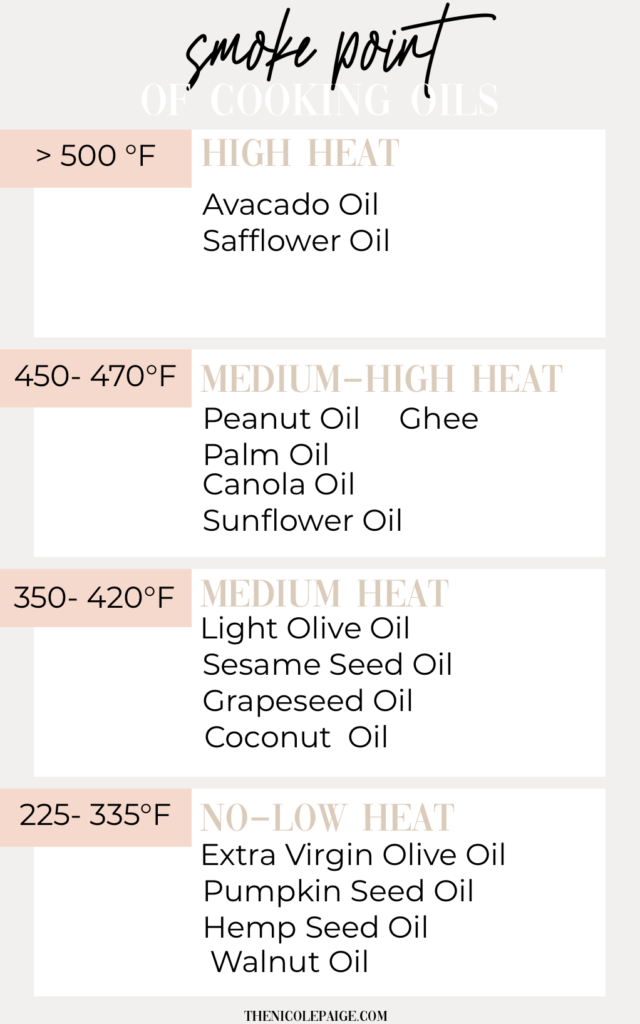
When I first started taking nutrition classes in college, cooking oils were always so confusing to me.
I never understood what ones were considered healthy…
What ones were best for certain kinds of cooking and recipes…
And how greatly the nutritional benefits varied. All the confusion led me to scouring the internet and reading books to find answers.
Obviously not everyone is as intrigued by nutrition and the specifics of cooking as I am, but for those who are as health obsessed I figured this article was perfect for you.
I wanted to make this a fun article and something you could refer back to whenever you are cooking or making everyday recipes. Before we get started…
I want to disclaim that the information in this article is what I found from doing research. Everyone has their own opinion on what is considered “healthy” and I’m by no means an expert on the subject.
With that out of the way, let’s dive in!
Why Do We Need To Be Eating Healthy oils?
People easily get scared away from fats, including oil, because they think it’s the root cause of weight gain or fat is considered “bad for you”. This couldn’t be further from the truth.
Fats play a crucial role in our body and should be consumed on a daily basis.
Important Roles Fats Play In The Body:
- Fats are necessary for the absorption of the fat soluble vitamins (A, D, E and K).
- Fats provide your body with long-term energy.
- Fats help to keep you feeling full and satisfied for longer.
- Fats make up the cell membrane of our cells, giving our cells structure.
- Fats play an essential role in formation and growth of hormones.
- Fats from food give your body essential fatty acids such as linolenic acid (omega-6 fatty acid) and alpha linolenic acid (omega-3 fatty acid), which cannot be made by the body itself. These fatty acids help with inflammation, wound healing, brain development and blood clotting.
Which Oils Are Considered The Most Healthy?
Olive Oil: When you think of healthy oils, the first one to pop in your head is probably olive oil. Olive oil is full of monounsaturated fatty acids, which are great for heart health, full of antioxidants and provides a good source of vitamin E.
Avocado Oil: Avocado oil is one of my favorite healthy oils to use for cooking due to its high smoke point. Some of its benefits include essential fatty acids, naturally occurring oleic acid (a monounsaturated omega-9 fatty acid) and, similar to olive oil, avocado oil is high in heart healthy monounsaturated fatty acids.
Peanut Oil: Peanut oil is great for many different dishes. It contains monounsaturated fatty acids as well as vitamin E and phytosterols which are great for heart health. Some studies indicate these vitamins may protect against some forms of cancer such as breast and colon cancer.
Walnut Oil: Walnut oil is the most delicate of all the oils listed above making it great for things like salad dressings. Oils such as chia, hemp and flax all contain high amounts of omega- 3 fatty acids and are great for reducing inflammation. Walnut oil also may help to lower blood pressure, help with blood sugar regulation, and lower triglyceride and LDL ( bad) cholesterol levels.
Ghee: Ghee is relatively new to me, and isn’t necessarily an oil. It reminds me a lot of coconut oil because it is solid at room temperature. Ghee is clarified butter, meaning the dairy proteins are removed from it. I love ghee because it adds a buttery taste to foods and has some awesome health benefits. This fat is vitamin rich including all the fat soluble vitamins like A,D, E and K, supports a healthy digestive tract, and in general is a great butter substitute for anyone with a dairy intolerance.
Coconut Oil: Coconut oil is probably the most controversial on this list. The research on coconut oil and its benefits is not as in depth as needed to be conclusive. In general, coconut oil is high in saturated fats. Saturated fats are known to raise your bad cholesterol levels (LDL cholesterol) but also have been associated with helping to raise your good cholesterol (HDL cholesterol) levels too. Therefore, my conclusion on coconut oil is that it’s an oil that can be included in your diet in moderation.
Some other great oils include sesame oil (bomb in stir-fry or asian inspired meals), pumpkin seed oil, and grapeseed oil.
The oils I like to avoid are typically oils like canola, soybean, corn, sunflower, safflower and basically all vegetable oils. These oils are highly refined and processed, but can be used in cooking from time to time if you have nothing else on hand.
What Does An Oil’s Smoke Point Mean?
Smoke point is actually exactly how it sounds…
An oil’s smoke point is the temperature at which an oil begins to break down and smoke. This smoke makes the oil end up tasting burnt and bitter.
An oil’s smoke point is something you should pay attention to when choosing which healthy oil to cook with because once an oil surpasses a temperature higher than its smoke point, it impairs the oil in a few ways.
If the oil gets hotter than its smoke point the oil’s flavor not only changes, but it also can decrease the nutritional value of the oil and create harmful free radicals.
Smoke points of commonly used oils and fats:

Best for high heat cooking: Avocado oil, peanut oil, sunflower oil, safflower oil, canola oil, palm oil.
High heat oils are best for deep frying or searing
Best for medium heat cooking: Coconut oil, grapeseed oil, ghee or butter, light olive oil, sesame oil.
High-medium heat oils are best for stir frying, baking, sauteing and roasting.
Best for no to low heat: Flax oil, hemp oil, walnut oil, pumpkin seed oil, extra virgin olive oil.
Low or no heat oils are the best for salad dressings, sauces or dip (my fav!).
I hope this post helps those who are interested in healthy eating as much as me!
If you have any important info that I missed then leave it in a comment below.
Hopefully this will get everyone in the kitchen using healthy oils to cook with in all of your recipes.
xo,